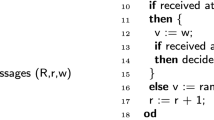Abstract
We consider a malicious unfair adversary which generates an undetectable fault by local checks, called an intentional fault. Though the possibility of such a fault has ever been suggested, details of its influence and handling are unknown. We assume the intentional fault in a self-stabilizing mutual exclusion protocol, a hybrid of previously proposed ones that complement each other. In the hybrid protocol, we can cope with the fault by using optional strategies, whether or not sending a minor token, which plays a role of preventing the contamination from spreading. We construct a payoff matrix between a group of privileged processes and an adversary, and consider a multistage two-person zero sum game. We interpret the game in two ways: whether it continues or replays the game after an ME(mutual exclusion)-violating repair, in which more than one unexpected privileges are given. For each case, we evaluate the ability of malicious unfair adversary by using a mixed strategy. Our idea is also considered as a general framework for strengthening an algorithm against an intentional fault.
Preview
Unable to display preview. Download preview PDF.
Similar content being viewed by others
References
Dasgupta, A., Ghosh, S., Tixeuil, S.: Selfish stabilization. In: Datta, A.K., Gradinariu, M. (eds.) SSS 2006. LNCS, vol. 4280, pp. 231–243. Springer, Heidelberg (2006)
Dijkstra, E.W.: Self-stabilizing systems in spite of distributed control. Communications of the ACM 17(11), 643–644 (1974)
Dolev, S., Israeli, A., Moran, S.: Analyzing expected time by scheduler-luck games. IEEE Transactions on Software Engineering 21(5), 429–439 (1995)
Ghosh, S., Gupta, A.: An exercise in fault-containment: Self-stabilizing leader election. Information Processing Letters 59, 281–288 (1996)
Ghosh, S., Gupta, A., Herman, T., Pemmaraju, S.V.: Fault-containing self-stabilizing algorithms. In: Proceedings of the 15th Annual ACM Symposium on Principles of Distributed Computing, pp. 45–54 (1996)
Ghosh, S., He, X.: Fault-containing self-stabilization using priority scheduling. Information Processing Letters 73, 145–151 (2000)
Herman, T.: Superstabilizing mutual exclusion. Distributed Computing 13(1), 1–17 (2000)
Herman, T., Pemmaraju, S.: Error-detecting codes and fault-containing self-stabilization. Information Processing Letters 73, 41–46 (2000)
Hohzaki, R.: A compulsory smuggling model of inspection game taking account of fulfillment probabilities of players’ aims. Journal of the Operations Research Society of Japan 49(4), 306–318 (2006)
Johnen, C.: Service time optimal self-stabilizing token circulation protocol on anonymous unidirectional rings. In: 21st Symposium on Reliable Distributed Systems, pp. 80–89 (2002)
Kakugawa, H., Yamashita, M.: Uniform and self-stabilizing token rings allowing unfair daemon. IEEE Transactions on Parallel and Distributed Systems 8(2), 154–163 (1997)
Kakugawa, H., Yamashita, M.: Uniform and self-stabilizing fair mutual exclusion on unidirectional rings under unfair distributed daemon. Journal of Parallel and Distributed Computing 62, 885–898 (2002)
Katayama, Y., Ueda, E., Fujiwara, H., Masuzawa, T.: A latency optimal superstabilizing mutual exclusion protocol in unidirectional rings. Journal of Parallel and Distributed Computing 62(5), 865–884 (2002)
Kiniwa, J.: Avoiding faulty privileges in fast stabilizing rings. IEICE Transactions on Fundamentals E85-A(5), 949–956 (2002)
Kiniwa, J.: How to improve safety under convergence using stable storage. IEEE Transactions on Parallel and Distributed Systems 17(4), 389–398 (2006)
Kiniwa, J., Kikuta, K.: Game theoretic analysis of malicious faults which are undetectable by local checks. IEICE Technical Report 108(330), COMP2008-47 (2008)
Kiniwa, J., Yamashita, M.: A randomized 1-latent, time-adaptive and safe self-stabilizing mutual exclusion protocol. Parallel Processing Letters 16(1), 53–61 (2006)
Koutsoupias, E., Papadimitriou, C.H.: Worst-Case Equilibria. In: Meinel, C., Tison, S. (eds.) STACS 1999. LNCS, vol. 1563, pp. 404–413. Springer, Heidelberg (1999)
Nisan, N., Roughgarden, T., Tardos, E., Vazirani, V.V. (eds.): Algorithmic game theory. Cambridge University Press, Cambridge (2007)
Myerson, R.B.: Game theory: analysis of conflict. Harvard University Press (1991)
Nesterenko, M., Tixeuil, S.: Tolerance to unbounded byzantine faults. In: Proceedings of the 21st IEEE Symposium on Reliable Distributed Systems, pp. 22–29 (2002)
Yen, I.-L.: A highly safe self-stabilizing mutual exclusion algorithm. Information Processing Letters 57, 301–305 (1996)
Author information
Authors and Affiliations
Editor information
Editors and Affiliations
Rights and permissions
Copyright information
© 2009 Springer-Verlag Berlin Heidelberg
About this paper
Cite this paper
Kiniwa, J., Kikuta, K. (2009). Analysis of an Intentional Fault Which Is Undetectable by Local Checks under an Unfair Scheduler. In: Guerraoui, R., Petit, F. (eds) Stabilization, Safety, and Security of Distributed Systems. SSS 2009. Lecture Notes in Computer Science, vol 5873. Springer, Berlin, Heidelberg. https://doi.org/10.1007/978-3-642-05118-0_31
Download citation
DOI: https://doi.org/10.1007/978-3-642-05118-0_31
Publisher Name: Springer, Berlin, Heidelberg
Print ISBN: 978-3-642-05117-3
Online ISBN: 978-3-642-05118-0
eBook Packages: Computer ScienceComputer Science (R0)




